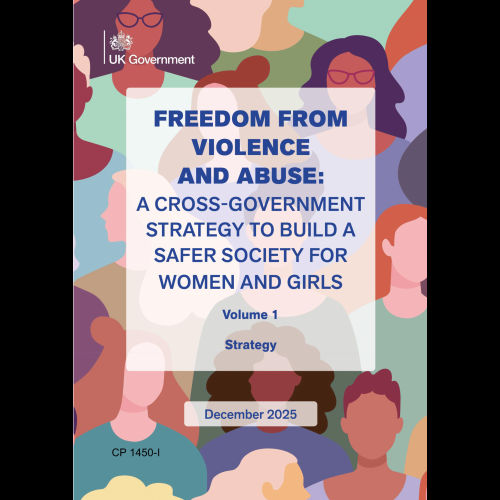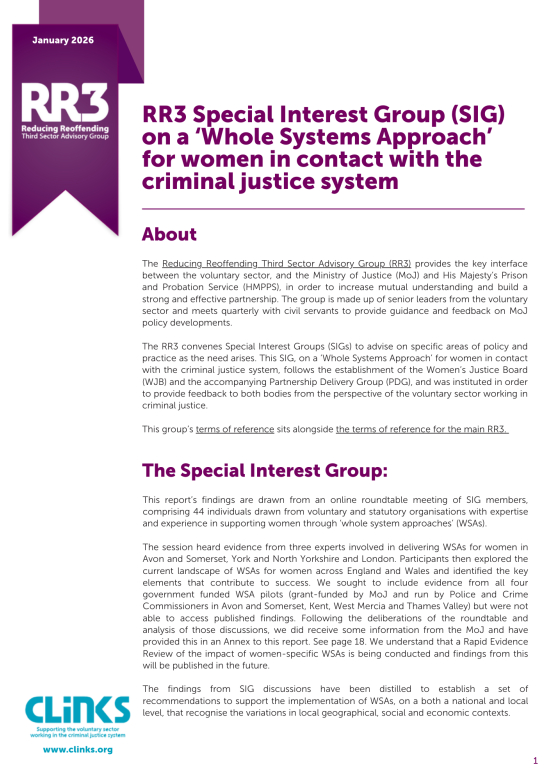This is a guest blog from Charlotte Caldwell, Research & Policy Assistant, i-HOP. Charlotte takes a look back at the conference jointly held by Clinks and iHop in December 2016. The conference, for professionals working with the families and children of people who have offended, enabled delegates to get up to date with the latest policy developments, and hear inspiring examples of best practice.
The role of family ties in improving outcomes for offenders and their families is gaining increasing recognition in the criminal justice debate, most notably through the current Farmer Review. Ministry of Justice figures suggest prisoners with regular family contact are less likely to re-offend, and more likely to find stable accommodation and employment on release. Despite this, Her Majesty’s Inspectorate of Prisons found support for prisoners to maintain family contact was both limited and inconsistent across the estate, with less than one third of prisoners receiving sufficient assistance to do so.
Yet it is not just the offender who benefits from family contact. An increasing body of research shows children’s outcomes are also negatively affected when a family member is imprisoned, including an increased risk of poor mental health and intergenerational offending. However, evidence suggests children may be better equipped to cope with their loss, and their outcomes improved, if they are able to maintain contact with their imprisoned family member.
With the prison service under increasing pressure, the role of the voluntary sector in supporting offenders and their families not only to maintain, but also improve their relationships, is paramount. It was against this backdrop that i-HOP, along with Clinks, chose to host a conference for professionals in the South West on ‘Promoting family ties in the changing criminal justice system’.
The conference, held in Taunton, drew together approximately 50 professionals working in statutory and voluntary services across the South West, including prisons, police, education and social care. The object of the event was to update those working in this area on current changes to the criminal justice system, equip them with a framework to develop their work supporting families affected by offending, and highlight examples of best practice from community-based organisations.
A changing criminal justice system
The morning of the conference focused on updating attendees on current and proposed changes within the criminal justice system directly impacting offenders’ families. Clinks CEO Anne Fox, who also chaired the event, opened the day by taking delegates through the Farmer Review, explaining the purpose of its commissioning, its call for evidence process, and current findings to date. Anne was followed by NOMS Families Lead for Public Sector Prisons, Richard Booty, who outlined the current commissioning process for family services in prisons across England and Wales. Finally, Barnardo’s Children’s Services Manager, Polly Wright, reported on findings from the South West Children and Families Pathway Review, and the steps being taken to implement required change across the region.
These sessions enabled attendees to develop a comprehensive understanding of the current changes to the criminal justice system, and the ways in which such changes may impact upon their work. Moreover, they provided the opportunity for delegates to offer suggestions to presenters, based on their direct experience of working in this area. Useful recommendations from the discussion included the implementation of an effective monitoring system to record the numbers of those affected by familial imprisonment, and improved information sharing between services working to support such families. All feedback was collated on the day, and will be used to provide further evidence for the Farmer Review, due to be published in the coming months.
Promoting best practice
The second half of the day shifted focus from the wider criminal justice system to promoting best practice in directly supporting the families of offenders. I-HOP’s Quality Statements and Toolkit was introduced to delegates by Lindsay Sutherland, as a framework for developing service provision. The Quality Statements and Toolkit provide eight Quality Statements – principles of best practice, along with a self-assessment toolkit, enabling professionals to assess and improve their work, ensuring children and families affected by offending receive the best possible support. Lindsay drew on practical examples of implementation from Bristol Children’s Centres, along with a powerful video of young people at Barnardo’s Bristol CAPI service, to highlight the significant role the resource can play in improving outcomes for offenders’ families.
The Quality Statements and Toolkit was well received by all delegates as an effective framework to better understand and promote the needs of children and families affected by offending, to set organisational goals, and to improve outcomes for this group.
The remainder of the day served to highlight examples of best practice in the voluntary sector, showcasing two organisations working with families affected by offending in the South West. Delegates heard from EDP on their work supporting prisoners and their families affected by substance abuse, followed by CASS Plus on providing support for defendants and their families facing Court or Tribunal hearings. Both examples provided insight into work being carried out in the South West to support offenders’ families, as well as creating the opportunity for improved multi-agency working across the region.
Multi-agency conferences provide the opportunity for organisations working on the same agenda to come together to share knowledge and resources, improving practice and outcomes. Promoting family ties in the criminal justice system is an on-going challenge against the backdrop of an ever-changing sector. As government funding for such services continues to be cut, the voluntary sector in particular has an increasingly significant role to play in ensuring all children and families affected by offending are able to maintain contact with those in prison, where appropriate. Through seizing opportunities to come together to feed into government agendas such as the Farmer Review, utilising frameworks to improve service delivery, and continuing to share best practice, the voluntary sector will be well placed and well equipped to ensure children and families affected by offending are given the best possible chance to succeed in life, and those serving sentences equipped to thrive on release.
To view and download the resources from this event click here.
For more information on i-HOP please visit their website.
What's new
Blogs
Violence Against Women and Girls (VAWG) Strategy Blog
Publications
RR3 Special Interest Group (SIG) on a ‘Whole Systems Approach’ for women in contact with the criminal justice system
The RR3 SIG drives a Whole Systems Ap
Latest on X
The role is for a leader from an organisation focused on racially minoritised people, with expertise in service delivery, policy, advocacy, or related areas in criminal justice. Racial disparities are present at every CJS stage. This role ensures these voices are central in shaping policy to help address and eradicate them. Apply by Mon 18 Nov, 10am. More info: https://www.clinks.org/voluntary-community-sector/vacancies/15566 #CriminalJustice #RR3 #RacialEquity

